‘Entrepreneurs are like birds. They believe in themselves, are innovative, risk taking, determined, and must be open to change. Believe in yourself. Start and see things with a positive mindset. Nothing is impossible for a willing heart’.
Dr. Hiresha Verma
Founder and chairperson, Han Agrocare
Email: vermahiresha@gmail.com
Bhuvana N and Ditty Maria Dominic recently interviewed Dr. Hiresha, to explore her journey as an agripreneur from an IT professional since a decade. Excerpts from this interview.
|
Han Agrocare is a social-business enterprise, a blend of social good, innovative technology, hard work, women power and love, which results in healthy mushrooms round the year. Their mission is to cultivate and promote chemical free, hygienic, organic, exotic and medicinal mushrooms while conserving the environment and providing employment to women, landless farmers and tribals so as to meet the United Nation’s sustainability goals of gender equality, poverty alleviation, and health and wellbeing. |
Tell us briefly about yourself, including your academic background and areas of expertise.
As my father was a Commandant in the Border Security Force (BSF), my upbringing and living has been throughout India. Currently, I am settled in Dehradun, Uttarakhand. I have a Bachelor of Science from Bhonsala Military College, Nashik, and a Master’s in Human Resource from National University of HR, Chennai, followed by an MBA in International Business (in distance mode) from the Institute of Chartered Financial Analysts of India (ICFAI). I worked with TATA Telecom as a P&A executive for almost two years. Later, I started my own company ‘Hanzen technologies Pvt Ltd’, with focus on Business Process Outsourcing (BPO) & Knowledge Process Outsourcing (KPO) software development. I was a hardcore IT person back then. In 2010, I also started ‘Hanzen Consultants’, that focused on supporting firms with their business planning and strategies. Later, in the year 2012-2013, I closed my IT company and founded another company called ‘Hanzen International’, with specific focus on mushroom production and marketing in Dehradun.
How did you come to a decision on transitioning from an IT career to agriculture, despite lacking expertise in the agricultural field?
In 2013, I had an opportunity to assist flood-affected villages in Uttarakhand hills through an NGO. We provided essential supplies, such as food, clothing, and other necessities to the people in need. During my time there, I noticed a recurring theme in many villages: only women and children remain in these villages as the men had migrated in search of employment and never returned thereafter. Witnessing the struggles faced by these women and children deeply impacted me, especially since I am a single mother and understand the challenges of raising children alone while ensuring a good standard of living. I couldn’t shake off the images of their plight from my mind after returning from the hills. These women had limited education, no job opportunities, and their livelihoods depended on gathering firewood from the jungle. I often wondered how they managed to survive and support their children, considering the scarcity of resources in the hills. Introducing information technology (IT) to these remote areas seemed impossible given their educational backgrounds. For several months, I pondered over this predicament, trying to find a solution.
Eventually, I stumbled upon information about mushroom cultivation in the hills through an acquaintance. This idea ignited a spark within me, and I delved deep into researching and understanding the intricacies of mushroom cultivation. Although I was new to this sector, I wholeheartedly committed myself to learn from scratch and transform this information into a viable opportunity. This experience turned my life around completely. Today, I proudly stand as a mushroom entrepreneur founding ‘Han Agrocare’, empowering approximately 5000 women in Uttarakhand, Himachal Pradesh, Madhya Pradesh, Jammu & Kashmir and Maharashtra. Through mushroom cultivation, we have provided these women with a sustainable source of income and a pathway to self-reliance. It has been a very transformative journey, for myself as well as for the women back in the hills, who are with me today.
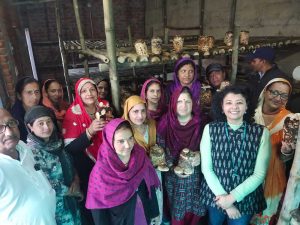 Women mushroom producers of Han Agrocare
Women mushroom producers of Han Agrocare
As a newbie in the mushroom production business, how did you empower yourself before empowering others?
It was very challenging to start everything from scratch in a completely new domain. But, the thirst to help the women and children and my prior experience of being an entrepreneur where I would get an idea about starting and running a business profitably and get it done, kept me motivated. But again, this particular enterprise was nowhere related to any of my prior experiences. It demanded a unique skillset and knowledge that one had to acquire first-hand. Initially I did much research and reading to understand the agriculture sector and on the importance of mushrooms in India and overseas. With the basic knowledge and understanding gained from my research, I tried to experiment by myself in my small servant quarter at Dehradun where I invested INR 2000 in production of oyster mushrooms. The production was good and I also learnt it practically. This attempt gave me the assurance of ‘Yes, this enterprise is doable and also viable’. But many things had to be refined to make it professional and quality oriented for the market.
So, I went to ICAR-Directorate of Mushroom Research (DMR) centre, Solan. I took training from there to make my mushroom cultivation more scientific. In addition, I also enrolled in several other training programmes related to mushroom production practices to make my skills perfect. Once I gained the skills and got confidence, I started approaching and convincing women in the hills to take up mushroom production.
Later, when we had a plan to install an AC plant, we needed professional training. In addition to DMR support from Solan, I also went to the International Society for Mushroom Science (ISMS), Beijing, China, to get professional training in mushroom cultivation. That made quite a difference in making the whole organizational setup and production activities professional and quality oriented.
How did you mobilize women into mushroom production?
I had some basic ideas about the villages where more women were left behind in the hills, so I started travelling to different villages and identified the women. Initially, I faced the challenge of acceptability and trust among them. They were not ready to listen or accept me. So, I adopted the following strategies:
- I started sharing my expertise on mushroom production and enlightened them on this practice and that it could be a source of good earnings for them;
- I supplied them with compost, spawn and all other inputs free of cost and asked them to grow and sell on their own;
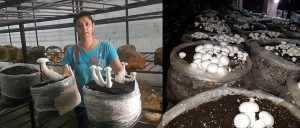 Mushroom production at Han Agrocare
Mushroom production at Han Agrocare
- We needed a place to keep our mushroom bags. I identified the rooms/schools/cow sheds/ houses which were vacant in the villages. I arranged for a temporary infrastructure by utilizing all these vacant places and asked the women to start their productions in these places;
- I started a training programme for the interested – free of cost – where I gave them compost, spawn, and other necessary supplies.
At first only five women turned up whom I trained on skills related to mushroom production. The training had both theory and practical sessions. It used to take me about 3-7 days to set up some skill sets in them on mushroom production as I had to start from scratch. I did this mainly to make them realise the benefits of mushroom production. They used to get good income and were happy also, which gave me immense satisfaction. So, initially it started with five women, later it grew to 10, 60, 100, and today more than 5000 women are involved in mushroom production activity with me.
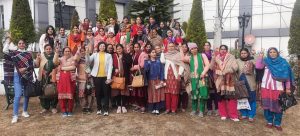 Microentrepreneurs of Han Agrocare
Microentrepreneurs of Han Agrocare
To mention a case, in the tiny hamlets of Chamoli, Tehri, Haldwani and Gopeshwar more than 1200 women are into mushroom production activities. Now we are present in Himachal, Uttarakhand, Jammu & Kashmir through our trainings. Currently we have plans to start training and promoting women micro entrepreneurs in mushroom production in Chinchuwada (Madhya Pradesh), Jaipur (Rajasthan) Hyderabad (Telangana), and Vishakhapatnam (Andhra Pradesh). It was mainly word of mouth and one woman’s success that led other women in the village to get inspired and come forward to take up these production activities.
We are starting our second mushroom production unit at Telangana and Andhra Pradesh where we have entered into an MOU with Malla Reddy University, Hyderabad and Bharatiya Engineering Science and Technology Innovation University (BESTIU), Vishakapatnam. Probably, I can start my second branch in Telangana so that we can provide our service in the South and empower more women mushroom microentrepreneurs as there is much demand for mushrooms in southern states.
How did your enterprise perform during the difficult COVID-19 period?
Yeah, that was a very challenging and difficult period. In our enterprise until the pandemic, we were relying on the compost supplied by the state government of Uttarakhand. But, during the COVID-19 lockdown period we realised the worth of producing compost in our own farm unit as the compost supplied from government was irregular. This resulted in a big problem for mushroom production. My women farmers to whom I supplied compost started mentioning: ”Why can’t you start a production unit of compost, so that we can purchase it from you and we can be assured of the quality as well?” So, this is how my idea of putting up an AC plant came. So, I started with one very small compost unit in two rooms, and today I have ten rooms with complete compost unit and a spawn unit.
Another challenge experienced was that there was no market for mushrooms. Women couldn’t sell their mushrooms, it was thrown out, and much wastage was experienced. So, when I realised the situation, I asked all women mushroom producers to bring all their mushrooms to my plant. When all the mushroom were collected, the idea of value addition from mushroom was born. We started preparing mushroom pickles, mushroom papad, mushroom cookies, and many more value-added products. This is how our value addition activity started. I told them that you can grow and bring it here so at one place, we can make products and sell it.
So, during COVID days, amidst problems we innovated products and did not let even a single mushroom go to waste, and our second segment of value-addition activities started.
How did you end up producing medicinal mushrooms?
Simultaneously with our value-addition activities during COVID in 2019, I was considering medicinal mushroom production and marketing also because our country is importing medicinal mushrooms from China and Indonesia. So, I thought, why can’t we cultivate it in our own country? That is how our pilot batch of medicinal mushrooms such as Shiitake, Ganoderma, Lion’s mane, and Turkey tail, started in 2019. I did not start everything at one go. First, I started cultivating Shiitake, once it was possible to cultivate it then I went on to Ganoderma, followed by Lion’s mane and Turkey tail. This is how I eventually started and finalised the formulations. Since this is giving five times more price, I started making substrate of these mushrooms at our production unit and supplying to the women. I give training for women in the hills on how to produce these, the key aspects to be taken care of, etc.
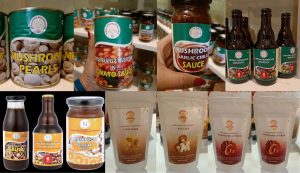 Value added products and nutraceuticals of Han Agrocare
Value added products and nutraceuticals of Han Agrocare
Accordingly, they started growing these mushrooms and I started buying back the produce from them so that they don’t have to travel anywhere to market these. We have found buyers for it across India and internationally also. So, I buyback all the produce. Today, I have more than 2000 women with me who are producing medicinal mushrooms and earning Rs. 10,000 to Rs. 15,000 per month.
We make value-added products and extracts from these mushrooms. From these extracts we make nutraceuticals. For example: Ganoderma is very good at addressing the issues related to sleeplessness, anxiety, depression. Lion’s mane is a very good brain tonic for attaining focus and reducing the chances of getting Alzheimer’s and Parkinson’s disease. Turkey tail is very good for those with diabetics; Shiitake is very good for enhancing immunity. All these have anti-cancer, anti-viral, anti-inflammatory and antioxidant properties. These are rich sources of Vitamin D2. We have a good team of specialists who extract these bio-compounds. Now, we have started making powder, capsules and tincture from these.
How did the women respond to your proposal for producing medicinal mushroom?
Initially it was a challenge convincing them and many were resistant to change from button mushroom production to medicinal mushroom production, due to the convenience of marketing and comfort of production. Once, they realised the higher margins and assured market from us, now most of them are into medicinal mushroom production. For button mushroom, they were getting Rs.100/kg, for medicinal mushrooms they are getting Rs.500 to Rs. 600/kg. This margin made them change from button to medicinal mushroom production. The women were trained on medicinal mushroom production and now they grow these medicinal mushrooms on their own.
 Medicinal Mushrooms
Medicinal Mushrooms
How do you provide support to your farmers?
I have a good professionally trained team both at the back end and front end of my enterprise We have 22 staff now and 90% of them are women. They are in production, marketing, procurement, accounts and administration. Our team trains women, landless farmers, tribals who take substrate for mushroom production from us. We also handhold them during the production process, provide needed technical support and buy back their products. With regard to infrastructure, we have our own mushroom and compost production plant; spawn production, substrate production unit; food processing unit; extraction unit; and packaging unit. It took me eight to nine months to have all the infrastructure in place and functioning properly. We also have a marketing team to market our medicinal mushrooms.
How did you maintain year-round production before the infrastructure was in place?
Before we installed our production infrastructure, we managed our production basically in huts. Our production was continuous. We planned it very intelligently. We used to take up alternate tunnel production. First only one tunnel production in two rooms (where one tunnel has capacity of 20 tons of mushroom production), followed by second batch of production. By the time we had the second batch of produce, the first one had already met the market needs. So, this alternate batches system helped us to meet the demand in the market throughout the year. The products were sold under the brand name ‘Hiresha’s World of Mushrooms’.
What is the secret behind the many recognitions you have gained and the title ‘Mushroom Lady of India’?
I am very keen to learn and improve myself with respect to the knowledge and skills related to mushroom production, and also make my company attain the greatest heights professionally. This can happen only when my company and product is unique. But only uniqueness doesn’t fetch the result. It must be made known to the world. So, I actively take part in several entrepreneurial programmes, and started participating in competitions. The idea was not to get any awards or recognition. The idea was to learn and spread the word on our medicinal mushrooms all over. More and more people should know about it. In India, we are not generally aware of medicinal mushrooms and it is not in our staple diet; moreover, several myths revolve around it. But it has several health benefits. In China, there are several traditional medicines from these mushrooms which Indians have not realised.
So, just to spread this knowledge around, I started participating in all the government entrepreneurial programmes conducted by the Ministry of Micro, Small & Medium Enterprises (MSME), Department of Biotechnology (DBT), and Niti Aayog. In addition to spreading the importance of medicinal mushrooms, this also brought me much recognition and awards for the uniqueness of both the product and the enterprise.
What kind of collaborations do you have at Han Agrocare?
I enter into MoUs with universities for product development and evaluation. We utilize their research labs and expertise for a variety of product development and testing. The strategy I use here is, I enter into an MoU with one university for only one product; for example, if I collaborate with one university to do research on a beverage, then I collaborate with another one to do research on bakery products, and so on. Likewise, until now we have collaborated with six universities for six products’ development and evaluation.
 Dr. Hiresha as Chief guest at Uttaranchal University
Dr. Hiresha as Chief guest at Uttaranchal University
For marketing, we have collaborated with few people who does influential marketing for us. But not much as we have our own people to do marketing on online (e-commerce website) and offline platforms.
Please tell us about your incubation journey.
I joined many accelerators and incubators. I acquired my incubation knowledge from various sources: Nexus US Embassy, Atal Incubation Centre (AIC ISB), Indian School of Business (ISB), and ICAR-Pusa Krishi. I also completed my ambassador programme from Goldman Sachs. Even today I am doing ‘Shitij’ incubation programme from ICAR-PUSA Krishi. These incubation and accelerator programmes continue to enhance my knowledge and skills on a regular basis as this is not my forte and was never my field. I read and study a lot. I keep on updating myself and these keep me moving along with the best.
Are your products available in the hypermarkets?
We are soon launching our products in the hypermarket chains. This has not been done until now because they take most of the margin and we needed funds. As we are now quite established, very soon we will be launching our products on online marketplaces, such as Flipkart, Amazon, Snapdeal, and some other export portals. Presently, we are selling through our e-commerce platforms and also offline where we keep our products in others’ outlets, like supermarkets. If we are to open our own outlet it will call for more funds and at present much of my fund flow is into R&D and helping women.
What digital tools do you use to develop and promote your enterprise?
As I have knowledge of running an IT firm most of my earlier team members were from that field, this and my own personal IT skills are helping me in this company as well. Most of the BPOs and lead generation teams are involved in getting market deals by telephone calls, online searches for market leads and regular follow-up. KPOs help in research and development. Now, digitalization of the company is underway where we are adopting artificial intelligence (AI) techniques for market analysis. My digital background actually helped me much in promoting my products on standardized e-commerce platforms, and to publicize in social media and analyse the trend of sales and demand and follow-up. I have focused on making my enterprise smart where the staff monitoring, evaluation, and activities moderation are all done online using AI techniques. To be specific, every employee has to go through Key Performance Indicators (KPI), Key Result Areas (KRA) online. The whole organizational system has been made very systematic where they get general orientation, company orientation, and they have to undergo their personal KPI, KRA. To make the organization smart, these smart skills and techniques are adopted. Even to analyse the market situation, my analytical skills gained from my IT experience has helped me to progress at a faster pace. Or else, it would have been very difficult to manage all alone.
How are you managing finances for your enterprise?
Actually, the company started formally from 2015. From 2013 to 2019 it was more of a trial and error situation. It was a proprietorship company at that time with just me investing without any returns. In 2019, I registered it as a legal entity and so one can say it started from zero and today our turnover is more like 3 crores.
Any capacity building activities for women from Han Agrocare?
As mentioned above we provide training on mushroom production for women. In addition, recently we started training university students also when the university requests it. Depending on the kind of batch the training period varies from three days to one week. We have PowerPoint presentations where we make our participants get the necessary knowledge visually through photos, movies and our work stories. Most of our training is visual and practical oriented. No classroom kind of teaching, and it is completely skill based.
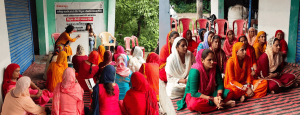 Training on mushroom production to rural Women
Training on mushroom production to rural Women
Can you tell us some of your personal challenges and how you overcame those during the initial days of Han Agrocare?
When I decided to shift from IT to agriculture, no one including my family members or friends supported me. Instead, everyone made fun of me. Only my children supported me in those days. Even before I started, everybody declared me a failure. You need to have a strong mind to overcome such emotionally draining situations. I was determined to make it happen and show everyone that I can do it.
I started from a farm at Dehradun where I prepared compost for mushroom production. I had failed eight times continuously in making the perfect compost. My money drained away like crazy in the process. Everybody around me were like shut it off, it is not your cup of tea. But I did not leave my trial and continued with my effort to make it. Today, you won’t believe that we are so proficient in making compost for mushrooms that we are sending our compost to all of Uttarakhand, Uttar Pradesh, Himachal and other places. So, continuous persistent practice made things happen right in my case.
Another most important challenge was getting finances as the banks were not willing to provide loan for the enterprise. Initially the bankers did not trust the product as it is perishable in nature. After several visits to the bank for seven to eight months, INR 60 lakhs was sanctioned for infrastructure and working capital. In three years, I repaid this, but this whole process was really tiring. Nobody (family/friends) supported me financially in those days. But now everybody is standing in line to support me. Perceptions have changed about me and my company today but not before Han Agrocare.
Later, availability of quality spawn for mushroom production was also an important challenge where I invested in our own spawn production unit to meet the demand.
Lastly, I can say marketing. The vendors want to purchase our products at a very low price. Even with the best quality, they used to pay Rs. 20 less to us when compared to the payment they make for the suppliers who are men. I used to fight for it and take a firm stand. Then, I started selling these mushrooms by myself in small 50-100 gm pouches. I used to go early morning around 4 AM and sit near parks and places where people come for morning walks and sell to them. Like this we got our product recognized and also got more margin by selling in this manner.
What kind of strategies have you adopted to make things work with women at Han Agrocare?
I always prepared myself well (learn everything and learn in depth) before stepping out to teach and train women. There are cases where women don’t come forward and have the notion that ‘things don’t work for them” Initially they were not ready to learn new things. Right at the start, they say ‘it is not possible’. So, under such circumstances, it is important for me to learn and demonstrate everything myself first and then show them how things work. Then they will start to accept and learn. In training my staff and women who produce mushrooms for us, I learnt and acted first and they followed me later. This is how I tried to motivate them – by example.
Secondly, the women in the hills had no clue about digital applications. Slowly and gradually, I had to teach them what the apps are all about and how it can be used to network, communicate and learn. The digital literacy trainings were also imparted non-formally. For instance, we have an employee who is just 10th class passed and had no clue about using computers or anything, so over a period, I taught her how to turn on the computer, turn it off, use MS office, manage documents, etc. Now, she does everything by herself. All these things did not happen in a day or a fixed period. As the company started evolving, these skills were also introduced among our women network and staff by me. In today’s world, digital literacy is very important. Realising that, I started to act on it quite early and my Han Agrocare family are in the process of learning and updating themselves. Also, mobile phones play a key role in making the learning process faster.
How many Awards and recognitions are in your basket now?
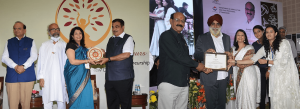 Empowering Women Entrepreneur of the Year 2021 on behalf of the Ministry of Micro, Small and Medium Enterprises, Government of India / Mushcon International Mushroom Festival- 19-20 October 2021
Empowering Women Entrepreneur of the Year 2021 on behalf of the Ministry of Micro, Small and Medium Enterprises, Government of India / Mushcon International Mushroom Festival- 19-20 October 2021
As mentioned earlier, nothing was expected. It all came my way during the process of Han Agrocare’s evolution. Much of the credit go to the women who have been with me in making things happen correctly. I have around 50-51 awards till date, but there’s still a long way to go. Latest one is from Niti Aayog where they have recognised us as one of the 75 innovative companies in India (https://www.niti.gov.in/sites/default/files/2023-02/Compendium-of-75-agri-entrerenuer.pdf).
 Other awards and recognitions for Dr. Hiresha
Other awards and recognitions for Dr. Hiresha
I am also awardee with ‘Accelerator in AWE’ Award from Banasthali & US Embassy in 2022; ‘Enterprising Women Entrepreneur’ Award from MSME and ICAR in 2022; International Recognition Award as the ‘Mushroom Lady of Uttarakhand’ 2021 from Government of India; ‘Best Progressive Farmer’ Award from ICAR in 2021; ‘Enterprising Women Entrepreneur’ Award from MSME 2021; ‘BEST Social Enterprise Award’ from Action for India in 2019, and many more. But, there’s still a long way to go and much more to do in mushrooms and women empowerment.
Where are you exporting your products currently?
We are currently exporting our products to Dubai-UAE, Qatar and Nepal. Very soon we are starting our exports to Canada, Indonesia and Europe. To enter into export markets, quality of the products is very important. To mention an incident, when we were pitching for Dubai market, all my competitors were from China and I was the only company from India. I just gave my samples and asked them to try it out. They were reluctant initially but, you won’t believe it when I say that our product was in the top list, higher than China which is one of the leading countries in mushroom production. Now, there is great demand for our product in Dubai. Initially the demands were like 400-500 kgs. But now it is goes by containers. So, we must work more to meet the demand without compromising on our quality. So, now I need more and more women in production activities to meet the huge demand.
What suggestions would you like to provide to policy makers to strengthen entrepreneurship in agriculture?
I observed that there is not much emphasis on medicinal mushrooms in agriculture-related policies. This needs to be addressed and there should be a provision to grant Ayush certificates for medicinal mushrooms. I feel that policies need to be regularly updated bearing in mind emerging areas such as medicinal mushrooms, hydroponics, vertical farming, etc., to promote new enterprises in these sectors.
What advice do you want to give to aspiring women entrepreneurs?
Nothing is impossible for a willing heart. If you think, you can do it, you will do it. When an IT background person like me can jump into the agriculture sector and make it happen, anything can be made possible.
Acknowledgement: This interview was done as part of the IRRI-CRISP ongoing project “Mapping of Good Practices in Digital innovations in India Supporting Women Agrientrepreneurs”.
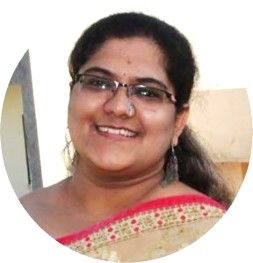 Bhuvana N, is a Research Consultant at the Centre for Research on Innovation and Science Policy (CRISP), Hyderabad. She has a PhD in Agricultural Extension, from Professor Jayashankar Telangana State Agricultural University, Hyderabad. Her research interests include organizational ecosystems and effectiveness, social networks and technological change. She can be reached at: bhuvanaditya7@gmail.com
Bhuvana N, is a Research Consultant at the Centre for Research on Innovation and Science Policy (CRISP), Hyderabad. She has a PhD in Agricultural Extension, from Professor Jayashankar Telangana State Agricultural University, Hyderabad. Her research interests include organizational ecosystems and effectiveness, social networks and technological change. She can be reached at: bhuvanaditya7@gmail.com
 Ditty Maria Dominic, Research Fellow at Centre for Research on Innovation and Science Policy (CRISP), Hyderabad, Telangana, India. She can be reached at: ditty794@gmail.com
Ditty Maria Dominic, Research Fellow at Centre for Research on Innovation and Science Policy (CRISP), Hyderabad, Telangana, India. She can be reached at: ditty794@gmail.com

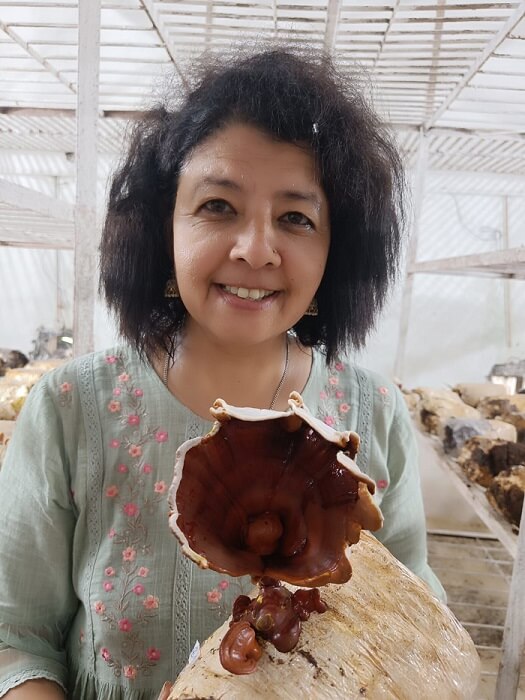



An inspirational story of an entrepreneur who fought against all odds to find her space in the mushroom business. Her contributions by motivating and bringing more women into this emerging business are really praiseworthy. Importantly, her digital skills helped in the most challenging area of any agrobusiness-Markting. The interviewers also need appreciation for conducting a well-studied, in-depth interview.
Another interesting story of an IT professional turned into agripreneur. Again it is sheer grit and self confidence in pursuing what she thinks is right made Dr. Hiresha Verma “ The Himalayan Mushroom Queen.” Despite her initial failures in standardising compost making and discouragement from her family members Dr.Hiresha continued her trials and successfully demonstrated the potentiality of producing and marketing medicinal mushrooms. Motivating the rural women in several states, imparting skills to them in mushroom production, helping them in getting inputs & buying the product, and expanding the scope of operation is highly appreciable. I wish Dr. Hiresha Verma may coordinate with several other mushroom entrepreneurs in production as well as marketing of the mushrooms.
Hearty Congratulations to Dr. Hiresha Verma on receiving the well deserved recognition as ‘Himalayan Mushroom Queen’. Thanks to Dr Bhuvana & Ms. Ditty Maria and AESA for making this story available to us. I am sure these stories motivate many to become successful entrepreneurs.